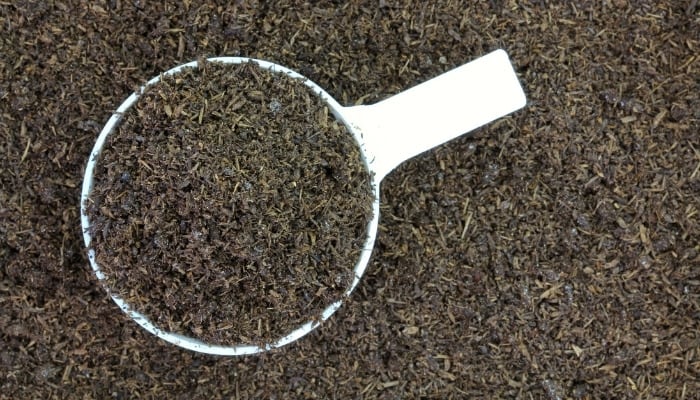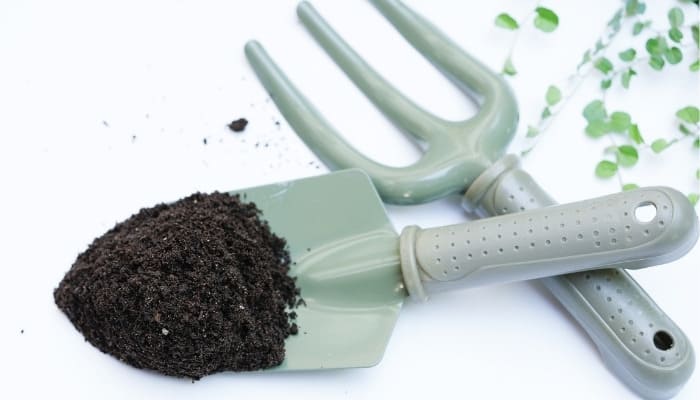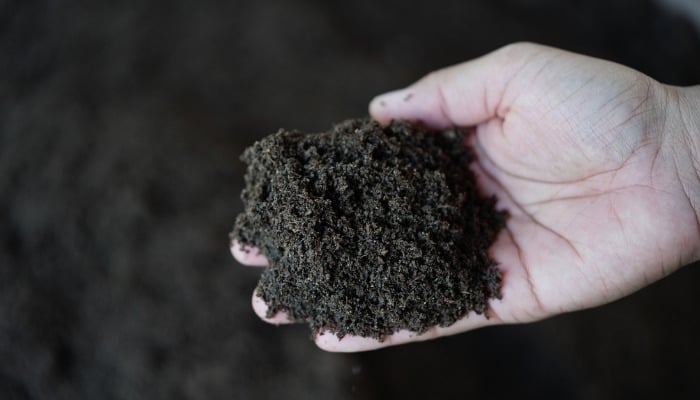For many years, worm castings have been kept as a hidden gem in the world of organic gardening. These valuable fertilizers are essentially composed of worm manure that is harvested from a worm farm or vermicompost bin.
Creating worm castings can be a quicker process than composting and can offer even more benefits for your plants.
What are worm castings good for? Worm castings act as a fertilizer and soil amendment to improve soil health and increase plant immunity. They contain nutrients and beneficial microbes. The nutrients are lower in concentration than traditional fertilizer and are in a bioavailable form, so they won’t burn plants.
Worm castings can be simple to produce. You just need a small worm farm bin and some food scraps or yard waste.
Taking care of a worm farm is a great activity to get kids involved in gardening. It also provides the opportunity to learn about the nutrient cycle.
Using Worm Castings in the Garden
Using worm castings can be as simple as spreading the product over your soil periodically. They are easy to use, but the benefits can be miraculous for your plants.
What Are Worm Castings?
Worm castings are worm manure. They are excreted by earthworms after they eat organic material and food scraps.
The castings can be added to your garden as a fertilizer, soil amendment, and microbe addition.
Worm Castings Benefits
Nutrients are actually not the greatest benefit from using worm castings. The castings contain microbes that help increase soil aeration and water retention.
These microbes increase the health of the soil and therefore the plants, making them better prepared to fight against pests and diseases.
Worm castings also increase the amount of organic material in your soil.
Disadvantages of Worm Castings
Worm castings can take a long time to produce if you are making them yourself. It is usually a 3-6 month process for your worms to break down the organic material and scraps in their bin.
The process is also harder to scale for larger operations.
Once the castings are produced or acquired, they need to be spread over the garden. Large-scale operations may have trouble efficiently spreading the castings.
One solution to this is steeping the castings to produce worm tea. The tea can then be easily dispersed throughout the garden.
Nutrients in Worm Castings
Worm castings are an organic fertilizer option. They contain the necessary nutrients of nitrogen, phosphorus, and potassium.
The castings also contain iron, calcium, sulfur, and other micronutrients. In total, worm castings can contain over 60 trace minerals and micronutrients.
While the worm castings contain nutrients, the greater asset in the product is the microbes.
Throughout the lifecycle of these microbes, they can produce additional nutrients and convert them into forms that are easy for the plants to use.
Are Worm Castings a Complete Fertilizer?
For many plants, worm castings can be a complete fertilizer. However, plants that require high concentrations of certain nutrients will need additional fertilizers.
Some gardeners consider worm castings to be more of a soil amendment than a fertilizer.

Worm Castings NPK Ratio
The NPK ratio is the amount of nitrogen, phosphorus, and potassium in a fertilizer. This ratio is used for commercial fertilizers.
Since worm castings are an organic material, the NPK can vary based on the substrate and worm food used.
Additionally, the forms of these nutrients are different in commercial fertilizers and worm castings, thus the NPK ratio is not an accurate reading of the available nutrient levels in worm castings.
Are Worm Castings High in Nitrogen?
Yes, worm castings are high in nitrogen. Actually, all manure is high in nitrogen. Additionally, worm castings contain nitrogen-fixing microbes that can increase the nitrogen levels in the soil.
Do Worm Castings Add Nitrogen to the Soil?
Worm castings contain nitrogen-fixing microbes. These microbes can convert nitrogen in the air into a form that is available to the plant.
This provides higher levels of nitrogen in the soil for the plants to absorb and use.
Do Worm Castings Affect Soil pH?
Worm castings have a neutral pH. They will not affect the pH of neutral soil.
By adding worm castings (with a pH of around 7) to the soil, they can decrease the pH of alkaline soil or increase the pH of acidic soil.
If you are growing plants that need particularly acidic or alkaline soil, worm castings may affect the pH too much.
Are Worm Castings Better Than Compost?
Worm castings are generally considered a better fertilizer than compost. Both substances contain nutrients and beneficial microbes.
Castings contain higher amounts of plant growth hormone and higher nutrient concentrations. The humus in worm castings holds more moisture and nutrients.
Which Plants Benefit From Worm Castings?
All plants can benefit from worm castings. The nutrients in worm castings are in lower concentrations and more bioavailable forms than traditional fertilizer.
This means that there is no risk of fertilizer burn or toxic levels of nutrients. The microbes found in worm castings can help improve the health of any soil.
The only plants that may not benefit from large amounts of worm castings are those that need acidic or alkaline soil. Applying too many worm castings can move the pH to an unhealthy range.

Are Worm Castings Good for Fruit Trees?
Worm castings are an excellent fertilizer for fruit trees. When planting your fruit tree, you can add some castings into the hole before the root ball goes in.
This creates the perfect environment for your tree’s roots. The microbes in the castings help add nitrogen to the soil, keep the soil and plant healthy, and increase water retention in the soil.
Are Worm Castings Good for Citrus?
Worm castings can be wonderful for citrus trees. Citrus plants can be susceptible to many pests and diseases.
The beneficial microbes in worm castings can improve the plant’s immunity through healthier soil.
Can You Grow Plants in Pure Worm Castings?
It is not advised to grow plants in pure worm castings. Scientists have found that 20% is the best concentration of castings in your soil mix.
This is because worm castings contain plant growth hormones. When the amount of these hormones is too high in the soil, it can overload the plant and cause the plant to die.
How Long Do Worm Castings Last?
Worm castings can last for six months or more with proper storage. This means keeping the worm castings out of direct sunlight and in stable temperatures.
It is best to use an opaque, airtight container to prevent excess moisture or pests from getting into the castings.
Can You Overuse Worm Castings?
You cannot overuse worm castings. The nutrients in the castings are in lower concentrations and different forms than traditional fertilizers.
This means there is no risk of nutrient toxicity or fertilizer burn to your plants. Runoff is also not an issue when using worm castings.
The organic material in the castings holds onto moisture and nutrients. Plus, the bioavailable forms of the nutrients do not overload waterways and cause algae blooms.
The only way to overuse worm castings is if you apply too many to plants that need soil with a particular pH.
Either you will need to add a product to counteract the pH balancing of the castings or use fewer castings.
In most cases, the benefits of the microbes in the castings are worth the addition.
What Can You Use in Place of Worm Castings?
There is not a single product or substance that can recreate the benefits of worm castings exactly. Compost will add nutrients and beneficial microbes to your plants. Bone meal is an organic fertilizer.
If you have small amounts of worm castings, you can steep them in water to create worm tea. This worm tea can be dispersed across your garden using a watering can or a hose sprayer.
This “stretches” your worm castings to cover larger sections of your garden.
Can You Buy Worm Castings?
Yes, you can buy worm castings online or in a garden center. Online retailers, like Amazon, usually offer the most competitive pricing for worm castings.
How Much Does a Bag of Worm Castings Cost?
The cost of a bag of worm castings will vary based on the size of the bag, the quality of the castings, and the retailer. In general, you can expect to buy worm castings for $0.50 – $2.00 per pound.
How To Make Worm Castings
Worm castings are produced through vermicomposting or worm farming. This is a relatively easy process and can be done on smaller or larger scales.
You will need to purchase a vermicompost container (this one is excellent and it makes worm tea all by itself!) and earthworms (find them here).
Inside your worm farm bin, layer the following materials from bottom to top:
- Sand
- Wet newspaper
- Compost or manure
- Soil
- Worms
- Wet newspaper
- Kitchen scraps or yard waste
It can take 90 days to one year for your worms to finish eating through the food in your bin. Make sure that the soil stays moist and that the worms never run out of food.
How To Harvest Worm Castings
Worms will eat through almost everything in your vermicompost bin. This means that once the newspaper, food scraps, and yard waste are no longer visible, all of your substrate is now worm castings.
An easy way to harvest the castings is to dump everything from your worm farm onto a flat surface. Set up a new vermicomposter.
Separate the worms from the pile, and add them to the new worm farm with fresh food sources.
Some worm farmers like to use the process of dividing the bin. They will put the new substrate and food scraps on one side of the worm farm.
Once all the worms have moved over to the new side, they remove the castings from the old side. Then, they will add fresh substrate and food to the original side.
The process keeps the worms moving back and forth, allowing the farmer to know when the castings are ready on each side.
How To Store Worm Castings
Once you have collected your worm castings, they will need to be properly stored until you are ready to use them.
Place the castings in an opaque, airtight container. Keep the container in a location where it does not receive direct sunlight and the temperature is stable.
When properly stored, the castings will last for more than six months.
How To Use Worm Castings in the Garden
When starting your garden, you can mix worm castings into your substrate mixture. Make sure the proportion is 20% or less.
You can also add a small number of castings into each hole when transplanting new plants.
As a fertilizer, you can apply worm castings regularly to the top of the soil or mix them in. This can be a tedious process in larger gardens.
To make spreading your worm castings easier, consider making a worm tea. This is created by steeping the worm castings in water for 24 hours.
Worm tea contains the nutrients and microbes that are in the worm castings. The tea can be dispersed using a watering can or a hose sprayer.
Once you have steeped your worm tea, it should be used within 24-72 hours or the microbes will die off.
Worm Castings for Houseplants
You can add worm castings to your potting mix for houseplants. The microbes will help ward off pests and diseases.
The organic material in the castings increases water retention in the soil, so you won’t need to water as frequently.
You can also water your houseplants with worm teas for the nutrients and microbes.
How To Use Worm Castings for Potted Plants
You can use worm castings as an amendment in your potting soil mixture. Keep the proportion at 20% or below. You can also water potted pots with worm casting tea.
Potted plants, whether kept indoors or outside will benefit from the water retention of the organic materials in worm castings.
Unglazed pots, especially clay and terra cotta, are known for causing quicker water evaporation, so this can be a huge plus.
Conclusion
Regardless of what kind of garden you have, worm castings should be included in your plant care.
This simple substance acts as a fertilizer, adds beneficial microbes, increases water retention and aeration in the soil, and improves nitrogen levels in the soil.
It is easy to produce (or buy) and use worm castings for your garden, and the benefits are numerous, so why not get started today?

